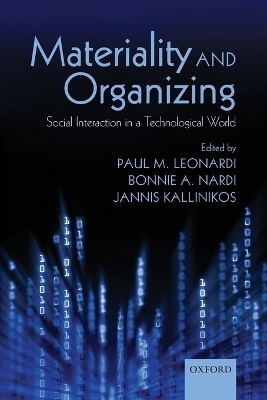
Materiality and Organizing
Oxford University Press (Verlag)
978-0-19-966406-1 (ISBN)
Ask a person on the street whether new technologies bring about important social change and you are likely to hear a resounding "yes." But the answer is less definitive amongst academics who study technology and social practice. Scholarly writing has been heavily influenced by the ideology of technological determinism - the belief that some types or technologically driven social changes are inevitable and cannot be stopped. Rather than argue for or against notions of determinism, the authors in this book ask how the materiality (the arrangement of physical, digital, or rhetorical materials into particular forms that endure across differences in place and time) of technologies, ranging from computer-simulation tools and social media, to ranking devices and rumours, is actually implicated in the process of formal and informal organizing.
The book builds a new theoretical framework to consider the important socio-technical changes confronting people's everyday experiences in and outside of work. Leading scholars in the field contribute original chapters examining the complex interactions between technology and the social, between artefact and humans. The discussion spans multiple disciplines, including management, information systems, informatics, communication, sociology, and the history of technology, and opens up a new area of research regarding the relationship between materiality and organizing.
Paul M. Leonardi is the Pentair-Nugent Associate Professor in the Departments of Communication Studies and Industrial Engineering and Management Sciences at Northwestern University where he teaches courses on the management of innovation and organizational change in the School of Communication, the McCormick School of Engineering, and the Kellogg School of Management. His research focuses on how companies can design organizational structures and employ advanced information technologies to more effectively create and share knowledge. He is the author of Car Crashes Without Cars: Lessons about Simulation Technology and Organizational Change from Automotive Design (MIT Press, 2012). Bonnie Nardi is a Professor in the Department of Informatics at the Donald Bren School of Information and Computer Sciences, the University of California, Irvine. An anthropologist, she has studied the uses of digital technologies in offices, schools, homes, libraries, hospitals, scientific laboratories, and virtual worlds. Her theoretical orientation is activity theory. She is the author of many scientific articles and books. Her latest books are My Life as a Night Elf Priest: An Anthropological Account of World of Warcraft (University of Michigan Press, 2010) and Ethnography and Virtual Worlds: A Handbook of Method (co-author, Princeton University Press, 2012). Jannis Kallinikos is Professor and PhD programme Director in the Information Systems and Innovation Group, Department of Management at the London School of Economics. His research covers a wide range of topics on the interpenetration of technology with the administrative and institutional arrangements of contemporary societies. Recent books include The Consequences of Information: Institutional Implications of Technological Change (Edward Elgar, 2006), and Governing Through Technology: Information Artefacts and Social Practice (Palgrave, 2011).
I. SETTING THE STAGE ; 1. The Challenge of Materiality: Origins, Scope, and Prospects ; II. THEORIZING MATERIALITY ; 2. Materiality, Sociomateriality, and Socio-Technical Systems: What Do These Terms Mean? How Are They Different? Do We Need Them? ; 3. On Sociomateriality ; 4. Form, Function, and Matter: Crossing the Border of Materiality ; III. MATERIALITY AS PERFORMATIVITY ; 5. Ranking Devices: The Socio-Materiality of Ratings ; 6. Great Expectations: The Materiality of Commensurability in Social Media ; 7. Digital Materiality and the Emergence of an Evolutionary Science of the Artificial ; IV. MATERIALITY AS ASSEMBLAGE ; 8. Inverse Instrumentality: How Technologies Objectify Patients and Players ; 9. Space Matters, but How? Physical Space, Virtual Space, and Place ; 10. Socio-material Practices of Design Co-ordination Across a Large Construction Project ; V. MATERIALITY AS AFFORDANCE ; 11. Theorizing Information Technology as a Material Artifact in Information Systems Research ; 12. The Materiality of Technology: An Affordance Perspective ; 13. Pencils, Legos, and Guns: A Study of Artifacts Used in Architecture ; VI. MATERIALITY AS CONSEQUENCE ; 14. Materiality: What are the Consequences? ; 15. Why Matter Always Matters in (Organizational) Communication ; 16. The Materiality of Rumor ; VII. EPILOGUE ; 17. Matter Matters: Materiality in Philosophy, Physics, and Technology
| Verlagsort | Oxford |
|---|---|
| Sprache | englisch |
| Maße | 178 x 234 mm |
| Gewicht | 588 g |
| Themenwelt | Mathematik / Informatik ► Informatik |
| Naturwissenschaften | |
| Sozialwissenschaften ► Kommunikation / Medien ► Kommunikationswissenschaft | |
| Wirtschaft ► Betriebswirtschaft / Management ► Planung / Organisation | |
| ISBN-10 | 0-19-966406-4 / 0199664064 |
| ISBN-13 | 978-0-19-966406-1 / 9780199664061 |
| Zustand | Neuware |
| Haben Sie eine Frage zum Produkt? |
aus dem Bereich


